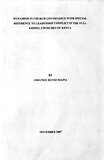| dc.description.abstract | This is a study on church leadership and the conflict which is part and parcel of its
development. It focuses on the problem of an intense leadership conflict which emerged
in the Full Gospel Churches of Kenya soon after the leadership transition in the year 2002
with an objective of finding out its causes. In addition, it finds out the signs, nature and
co,nsequences of internal leadership conflict in this church. Further, the study examines
how the church handles internal conflict and the effectiveness of the conflict resolution
mechanism in operation.
The study utilizes two main methods of data collection, library research and field
research, with the latter being the main source of data. The field research was conducted
between February and August 2007. The data gathering process consisted of use of
questionnaires, in depth, interviews and documentary analysis. In this case, the
documental evidence includes among others, official letters, court/legal documents,
minutes of official meetings, print media reports and personal letters.
The study is based on a conflict operation model which asserts that conflict originates
from personality differences which are likely to develop to more destructive forms. It is
also based on several hypotheses. Among them is the assumption that power struggle and
control of resources is the main cause of conflict is ecclesiastical polity and that the
forces of modernization and globalization are-leading to new forms of conflicts in the
church leadership
Having dissected conflict in the F.G.C.K. governance and explaining its nature from a
phenomenological perspective, the study came up with several findings. Among these
findings, personality differences emerges as the primary cause of leadership conflict
besides the finding that power struggle and administrative failure are the major causes of
the same. In addition, the study found out that self centeredness, lack of loyalty to the
church and loss of confidence in the church government are major contributors to conflict
in/the F.G.C.K.
With these and other findings in mind, the researcher makes suggestions which could
possibly be used in attempt to reinstate the F.G.C ..K. to a stable state. In conclusion, the
study observes that growth in church governance goes along with emergence of
differences among leaders which should be handled appropriately. Otherwise they can
lead to intense conflict It also asserts that the management, reduction and avoidance of
internal conflict in the church is a corporate responsibility of all the stakeholders, leaders
and lay members, without exception ..
. | en |

